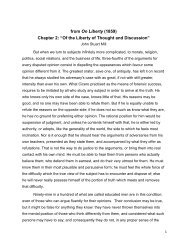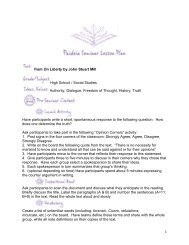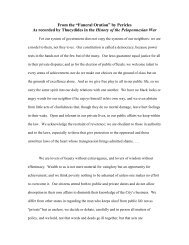Rousseau_contrat-social
You also want an ePaper? Increase the reach of your titles
YUMPU automatically turns print PDFs into web optimized ePapers that Google loves.
still reside in the majority: when they cease to do so, whatever side a<br />
man may take, liberty is no longer possible.<br />
In my earlier demonstration of how particular wills are substituted for<br />
the general will in public deliberation, I have adequately pointed out<br />
the practicable methods of avoiding this abuse; and I shall have more to<br />
say of them later on. I have also given the principles for determining<br />
the proportional number of votes for declaring that will. A difference<br />
of one vote destroys equality; a single opponent destroys unanimity; but<br />
between equality and unanimity, there are several grades of unequal<br />
division, at each of which this proportion may be fixed in accordance<br />
with the condition and the needs of the body politic.<br />
There are two general rules that may serve to regulate this relation.<br />
First, the more grave and important the questions discussed, the nearer<br />
should the opinion that is to prevail approach unanimity. Secondly, the<br />
more the matter in hand calls for speed, the smaller the prescribed<br />
difference in the numbers of votes may be allowed to become: where an<br />
instant decision has to be reached, a majority of one vote should be<br />
enough. The first of these two rules seems more in harmony with the<br />
laws, and the second with practical affairs. In any case, it is the<br />
combination of them that gives the best proportions for determining the<br />
majority necessary.<br />
3. ELECTIONS<br />
IN the elections of the prince and the magistrates, which are, as I have<br />
said, complex acts, there are two possible methods of procedure, choice<br />
and lot. Both have been employed in various republics, and a highly<br />
complicated mixture of the two still survives in the election of the<br />
Doge at Venice.<br />
"Election by lot," says Montesquieu, "is democratic in nature."[E3] I<br />
agree that it is so; but in what sense? "The lot," he goes on, "is a way<br />
of making choice that is unfair to nobody; it leaves each citizen a<br />
reasonable hope of serving his country." These are not reasons.<br />
85











